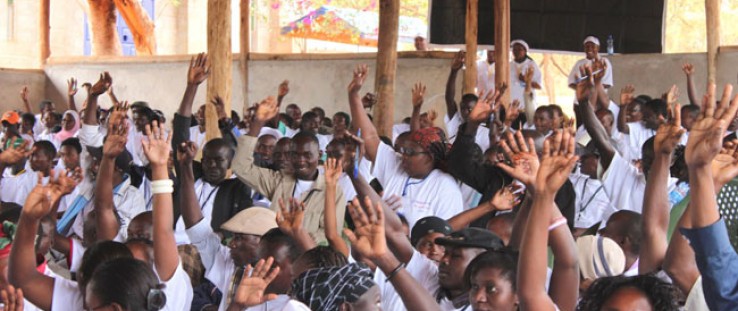 The Taita Taveta County Bunge Forum formed in October 2011. It is one of 26 county youth forums launched across Kenya in the past year.
Donatella Lorch, USAID
The Taita Taveta County Bunge Forum formed in October 2011. It is one of 26 county youth forums launched across Kenya in the past year.
Donatella Lorch, USAID
 The Taita Taveta County Bunge Forum formed in October 2011. It is one of 26 county youth forums launched across Kenya in the past year.
Donatella Lorch, USAID
The Taita Taveta County Bunge Forum formed in October 2011. It is one of 26 county youth forums launched across Kenya in the past year.
Donatella Lorch, USAID
Speeches Shim
The country’s ‘bunges,’ or democratic youth groups, are serving as a powerful counterweight to widespread apathy, unemployment and election violence, all the while fomenting tomorrow’s leaders.
The village of Mariaini spreads out across steep slopes of emerald tea, straggly corn and clumps of eucalyptus trees. It is deep in rural Kenya’s heavily populated Central province, a place where land is fragmented into small plots for subsistence farming and where there is little outside assistance. Only rutted dirt roads connect Mariaini to bigger towns.
Three thousand people live here, and according to the local chief, three-quarters of them are teenagers and young adults. Unemployment for that group hovers above 90 percent.
George Ngethe, 25, is the chair of the local youth group here or bunge, Swahili for parliament. His dark suit is draped loosely on his thin frame, giving him the look of an elegant yet earnest businessman as he hikes down the narrow path to the bottom of a hill where bunge youth are clearing ground for a greenhouse. Other members are tending 6,000 tea seedlings under plastic tarps that will be sold at a profit of three cents each.
“Before, no one recognized that youth could do anything,” explains Ngethe. “We have projects now. We have a voice. Now we are consulted. We have influence.”
The village, Ngethe and almost 50 other youth belonging to the Mariaini Pamoja Bunge are on the brink of a major transformation by USAID’s largest youth program in the world. Since 2011, under the rallying cry “Yes Youth Can,” more than 700,000 young people from thousands of villages have come together across ethnic, linguistic, religious and cultural lines to become youth bunge members. So far, 15,000 village-level youth bunges are officially registered with the Government of Kenya as self-help groups. Registering with the Ministry of Gender, Children and Social Development enables the bunges to open bank accounts, organize public events, and receive funding from government agencies. Bunges serve as a youth-owned, youth-led and youth-managed space for young Kenyans to develop new leadership skills and promote transparent decision-making about their priorities.
“By supporting the formation of the youth bunge structure, USAID has helped advance one of the key reforms envisioned in the new Constitution of Kenya, namely that youth have a mechanism for engaging the government on every level,” says Dr. James Nyikal, the permanent secretary of the Ministry of Gender, Children and Social Development.
A Youth Elixir to Election Violence
USAID introduced the bunge model based on significant research into the causes of Kenya’s post-election violence during 2007 and 2008, where youth were both victims and perpetrators. “The research showed that youth had no confidence in civil society or in the existing public or private institutions in Kenya. They wanted to run their own organizations and to help strengthen Kenya’s post-election recovery. Simply put, they wanted to be empowered,” says Dwaine Lee, director of the Education and Youth Office at USAID/Kenya.
The Kenyan Government officially defines youth as 18 to 35 years old. Out of a national population that numbered 40 million in the 2009 census, over a third are youth and the vast majority—like Ngethe and his fellow bunge members—are out of school with no regular work or income, and are vulnerable to recruitment into political campaigns and criminal gangs. Nearly 2.5 million young people are unemployed and barely 125,000 are absorbed annually into formal employment.
“Youth are critical to Kenya’s future political and economic stability. With national and local elections coming in March 2013, it is urgent for youth to coalesce around what they need and expect from Kenya’s elected leaders,” says Ahmed Issack Hassan, chairman of the Kenya Independent Electoral and Boundaries Commission.
“We Are the Majority”
Bunges motivate youth to improve their own communities with the resources they have in their villages and to use these assets as leverage to build new partnerships with donors, private businesses and government agencies. Youth elect their own leaders at the village level as well as individuals to represent them at the county level and to become members of the National Youth Bunge Association.
Berem Risper, 27, is the county bunge forum president from Elgeyo-Marakwet. A lecturer with a Ph.D. in economics, Risper represents the talent and leadership that the bunge movement has attracted.
“We are the majority,” she said. “I learned that we can mobilize a mass of youth and that we can solve our own problems. We have unique solutions to our unique problems. But we can also be a time-bomb …. We are tired of the same old promises from Kenyan politicians. They just keep on talking and never do anything.”
A critical part of the success of the program, which is implemented nationally by Mercy Corps, is the ability of youth to gain the support of local government officials, in particular the village chiefs. In Mariaini, Stephen Kio, the sub-location chief, is a huge fan of the local bunge.
Related Content
“We had a lot of hopelessness and lack of purpose with the youth because they didn’t have a hope for a better future,” Kio said. “I’m very happy because of the initiative. I’ve seen that the youth have been given a future.”
Mariaini shares similar problems with many other Kenyan villages: dire poverty, serious alcohol and drug abuse and, in the current election cycle, a stream of politicians prepared to rent a crowd for their rallies and buy votes.
Since joining the bunges and participating in discussions about their future and their role in their communities, many members are creating their own jobs. In addition to the tea seedlings they cultivate, members run a village “milk bar” in a tiny room on Mariaini’s only street. The milk bar is a source of income and provides a market that never existed before: Farmers have a place to sell their surplus milk, and families without cows have a place to purchase milk.
“At first the farmers only brought us 10 liters a day of milk,” Ngethe explains with a smile. “Then they discovered we have a real market and now we sell 165 liters a day.”
The milk is delivered at 6 a.m. in bright yellow plastic jerry cans. By noon on one day, there were only four liters left. For 13 shillings (15 cents), anyone can buy a steaming hot glass of milk and sip it on the wobbly wooden benches outside the shop.
Isabella Kihui, 28, one of the 17 women bunge members, is a trained baker. She has transformed her family kitchen into a mini-bakery and shares her profits with several of the bunge men who deliver her mini-cakes on their motorcycle-taxis to nearby villages.
Dues-Paying Members
USAID is disbursing small loans and grants through a competitive process to youth bunges as well as seed money through implementing partners for smaller activities. The Mariaini bunge received one such small grant to establish a learning resource center for the village with computers and a small library. But USAID’s involvement mainly serves as a catalyst for local support. In Mariaini, the bunge’s work so impressed the Kenyan Government that the Ministry of Youth is funding 90 percent of its greenhouse project.
The vast majority of bunge activities are organized without any financial support from USAID. Bunges collect dues from members and keep financial accounts. Most have bank accounts. The Mariaini bunge has used its own resources to build garbage pits around town and members regularly volunteer as garbage collectors.
The bunge is also trying to lure the youth away from the village alcohol bar. To that end, members have put together a dart room where, on weekend afternoons, they hold tournaments and charge a nominal admission fee. No drinking or smoking is allowed inside and the lines to play are always long.
Among those queued up to play is Joseph Chege, 26, another bunge member. He abused alcohol and drugs for years before the bunge work helped him give it up. “I now look forward to tomorrow,” he says. “Before, I drank all the time. I had no future.”
Bunge member Anastasia Kairu, 24, is considered one of the best dart players and feels empowered by her ability to compete with men. “You feel so proud, you give the men the challenge,” says Kairu. “It is not only the male who can play the darts, even the ladies can hit and win.”
The Ripple Effect
But the youth don’t only work within their small village world. The Mariaini bunge is also participating in a Kenya-wide, youth-led campaign that is mobilizing youth across ethnic, linguistic, religious and cultural divisions. An estimated 5 million of Kenya’s 12 million youth do not have national identity cards. Without these ID cards, they cannot apply for a formal job, open a bank account, access mobile money transfer systems, enter a government building or vote. USAID, in partnership with the Government of Kenya’s National Registration Bureau, has launched My ID My Life to mobilize youth across the country to assist their peers in navigating the complex ID application world.
The campaign has become a focal activity for bunges across Kenya. In Mariaini, Ngethe’s mobile phone number is penned in on My ID My Life posters. The posters are displayed on almost every wall on the main street—including the local latrines. The Mariaini youth coordinated with their regional district registration officer to bring a mobile ID registration unit to their village, registering over 30 youth in one afternoon. They are planning another ID drive before the voter registration period ends in October.
In the near future, bunge members will be invited to support voter registration, train as election observers and help organize community peace-building forums.
In Mariaini, one of the proudest people is the village chief.
“In the years to come, we are going to produce leaders and we’ll have a better community tomorrow,” Stephen Kio insists. “My administrative work will become easier and I’ll be sleeping very comfortably because I’ll have a better population, more informed and also more economically empowered.”
In Mariaini and across Kenya, youth now believe they can change society.
“USAID has helped us mobilize youth,” says Risper, the Elgeyo-Marakwet County Forum president. “It has had a huge impact. We have never had such a forum before.”
Mercy Corps, NCBA CLUSA, Winrock International, World Vision and Inuka implement this program in different regions of Kenya.
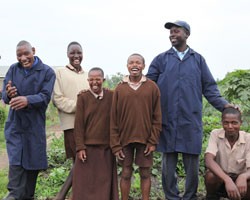
A Green Thumb Knows No Disability
By Clara Kakai
John Nyanjui is 28 years old and has an intellectual disability. As the time to graduate from vocational school approached, he worried he would have nowhere to go. Having come from a poor background, jobless and living in a society that can stigmatize people who are different, Nyanjui was uncertain about his future.
Youth unemployment makes up 70 percent of total unemployment in Kenya, according to the 2012 African Economic Outlook. Nyanjui would need to compete in an already stretched job market.
Despite his disability, Nyanjui is energetic and able. Before graduating in February, he discovered a new interest that turned his fortunes around. As part of vocational training, he and some of his friends learned gardening skills by helping with a newly launched school garden. With this new skill, Nyanjui landed a permanent job on the same school farm where he received training, and is now providing vocational training to a new generation of students.
This is all thanks to the USAID-funded Nutrition Kitchen Garden Program launched in October 2011 at Maria Magdalena Catholic Parish School in Thika. The school cares for the special needs of 110 children with intellectual and developmental disabilities between ages 15 and 29 and aims to help students be independent adults by equipping them with skills like masonry, beading and tailoring.
Real Impact, the Kenyan NGO that runs the program, has helped the school start and run a full-fledged garden where Nyanjui and his colleagues have been cultivating cabbages, pumpkin, fruit trees, bananas, sweet potatoes, carrots, amaranth, bananas, onions and a variety of other vegetables.
The effort is also part of the U.S Government’s Feed the Future initiative and targets marginalized groups like women and youth to help them become self-employed and financially independent, and to curb malnutrition and the need for relief food.
Children with disabilities are particularly vulnerable; many of them experience abandonment, abuse and exclusion from society. The Kenya Government Policy Framework for Education estimates that a quarter of the over 3 million people with special needs in Kenya are school-age children. Only 12 percent of these children have been properly assessed, and only 3 percent have any access to care and rehabilitation services. As a result, they also have few prospects of learning skills that can lead to employment and self-reliance. This means that they often remain dependent with a low quality of life – which just might explain why Nyanjui cannot hide his joy.
“I am very grateful for this job because I can now prove to everyone that disability is not inability. Now I can meet my own needs and even send something back home every now and then,” he says.
Thirty-two of his peers have also found new hope through this USAID program. Through the gardening skills acquired they can now find employment or cultivate their own gardens for food and income.

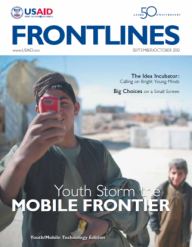

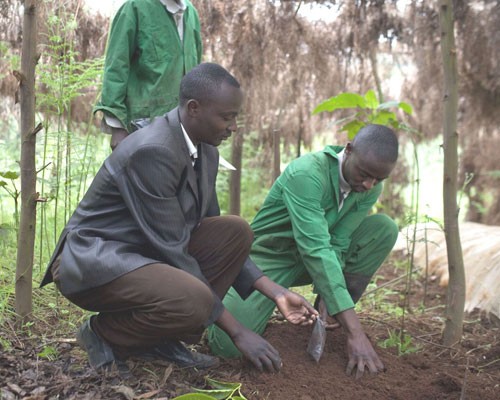
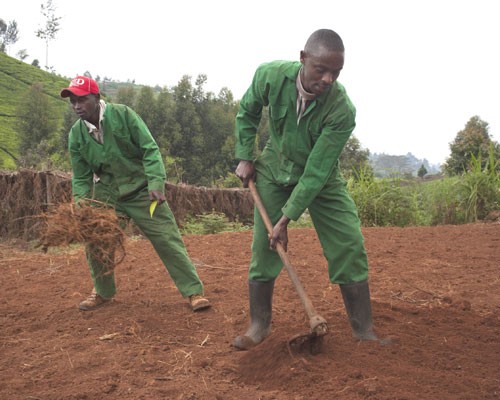
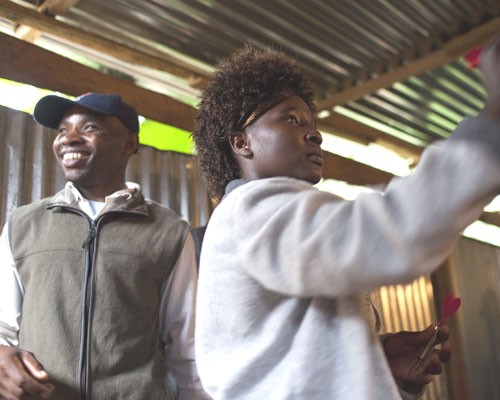
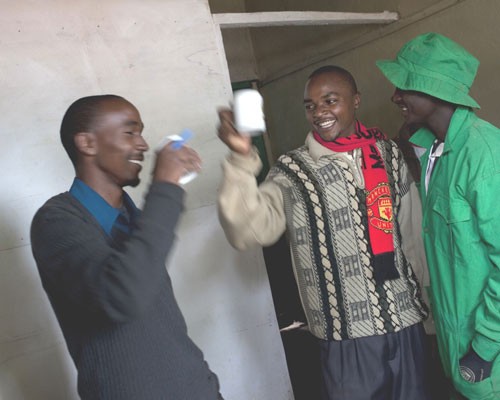
Comment
Make a general inquiry or suggest an improvement.